Voices of Emerging Scholars Webinar Series
Voices of Emerging Scholars series is developed to provide visibility to young historians and presents new research in Ottoman-Turkish studies to a wide network of scholars.

Starting as a Covid-19 project, the Voices of Emerging Scholars series is developed to provide some visibility to young historians (advanced Ph.D. students and recent post-doctoral scholars) and presented new research in Ottoman-Turkish studies to a wide network of scholars and students worldwide. We envisioned regularly held webinar meetings, organized around a shared theme.
Limiting the chronology to the late 19th century Ottoman and early Turkish Republican eras for practical reasons, we made calls for papers and received enthusiastic responses. We planned over twenty sessions, each promising to open fresh perspectives onto the discipline. The webinars that we held so far displayed rigorous, creative, critical, and bold thinking, addressed difficult questions, made unlikely connections, and revealed hitherto overlooked networks. The meticulous research was complex, relying on multitudes of archives, often in different places and necessitating familiarity with several languages. In brief, a lively scholarly community began to surface.
We support this group of brilliant young scholars further by publishing their papers in a special section of the Journal of the Ottoman and Turkish Studies. Resulting papers from the previous year were published in the journal’s Spring 2021, Winter 2021, and Spring 2022 issues.
This academic year, the webinars will be coordinated by Zeynep Çelik, Sakıp Sabancı Visiting Professor, Columbia University; A. Tunç Şen, Assistant Professor of History, Columbia University; and Merve İspahani, Ph.D., Academic Programs Manager at Columbia Global Centers | Istanbul, and sponsored by James Leitner.
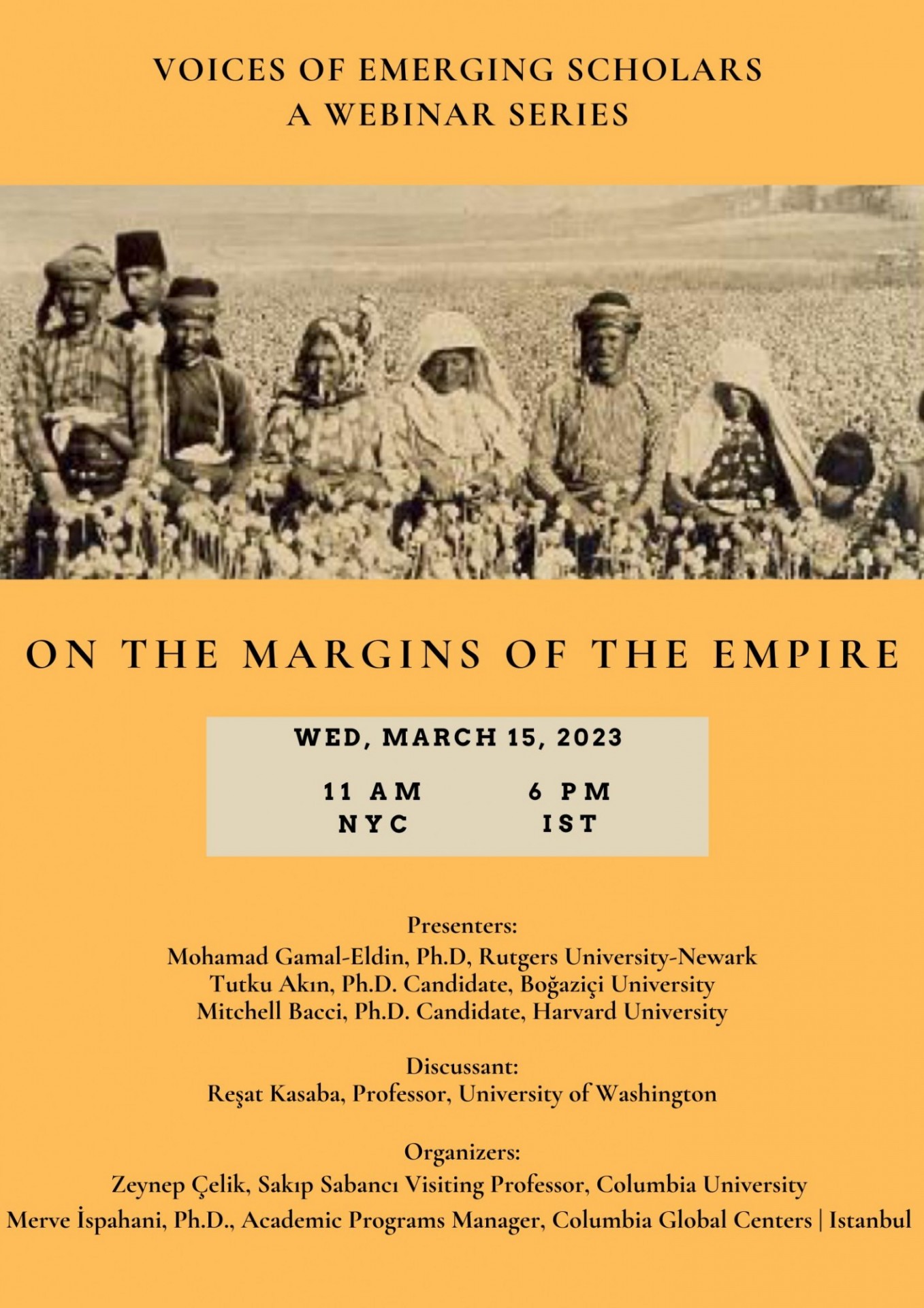
Watch the video here.
The 15th session of the Voices of Emerging Scholars webinar series is titled “On the Margins of the Empire,” an umbrella phrase which alludes to geography, people and economy. This session started with Mohamed Gamal-Eldin, who took us to Egypt to show that the town of Suez, although remembered in association with the construction of the Canal, actually had a long and bustling history. Following Gamal-Eldin, Tutku Akin took over to introduce a tribal Kurdish community living in the southeastern Anatolia. In her presentation, she scrutinized their social and economic life through power struggles and conflicts to reveal a myriad of actors ranging from tribal leaders and their wives, to government officials and to Sultan Abdulhamid himself. Finally, Mitchell Bacci turned to the peripheries of the market, specifically to opium smuggling. His research traced the activities of minorities involved in this informal trade against the regulated market, arguing that their activities coalesced into a significant resistance to state control.
Mohamed Gamal-Eldin is a historian interested in the built environment, natural environment, and infrastructure in order to tell narratives of urban residents in Egypt and the Modern Middle East from below. His most recent article, “Looking at Suez Canal Infrastructures: Water, Plants, and the Urban Drainage, Sewage and Bathroom Systems,” was published in IJMES. He teaches at the History Department at Rutgers-Newark and at the School of Architecture at the New Jersey Institute of Technology.
Tutku Akın studied at the History Department at Boğaziçi University. After she had graduated in 2018, she started her MA in the Atatürk Institute for Modern Turkish History at Boğaziçi University. Her thesis is on the Ottoman Tribal School, which was published by Libra Book in both English and Turkish. Currently, she is a Ph.D. candidate in the Atatürk Institute at Boğaziçi University. Her research interests are the political anthropology of the 19th century Ottoman Empire, the sociology of the tribes and the anthropology of the state. She is mainly conducting her research on the Hamidian era and the Muslim tribes in the Ottoman empire.
Mitchell Bacci is a Ph.D. candidate at Harvard's History and Middle Eastern Studies program. His dissertation examines smuggling as a mode of grassroots resistance to state power in the late Ottoman and interwar Eastern Mediterranean. He is broadly interested in informal political economy, the history of state formation, and the social history of psychoactive substances. Before coming to Harvard, Mitch earned a BA in Islamic and Asian history from the University of California, Santa Cruz and an MA in Middle Eastern Studies from the University of Texas, Austin.
Discussant:
Reşat Kasaba, Professor at the Henry M. Jackson School of International Studies at the University of Washington, is an expert in the history and politics of the Middle East. He has been teaching for over 30 years on a wide range of topics including economic history, state-society relations, migration, and urban history in the Middle East. Kasaba’s current research focuses on the political consequences of rural-urban divide in modern Turkey. He holds an M.A. and a Ph.D. in Sociology from the State University of New York at Binghamton. Kasaba has written and edited seven books and over 40 articles and opinion pieces.
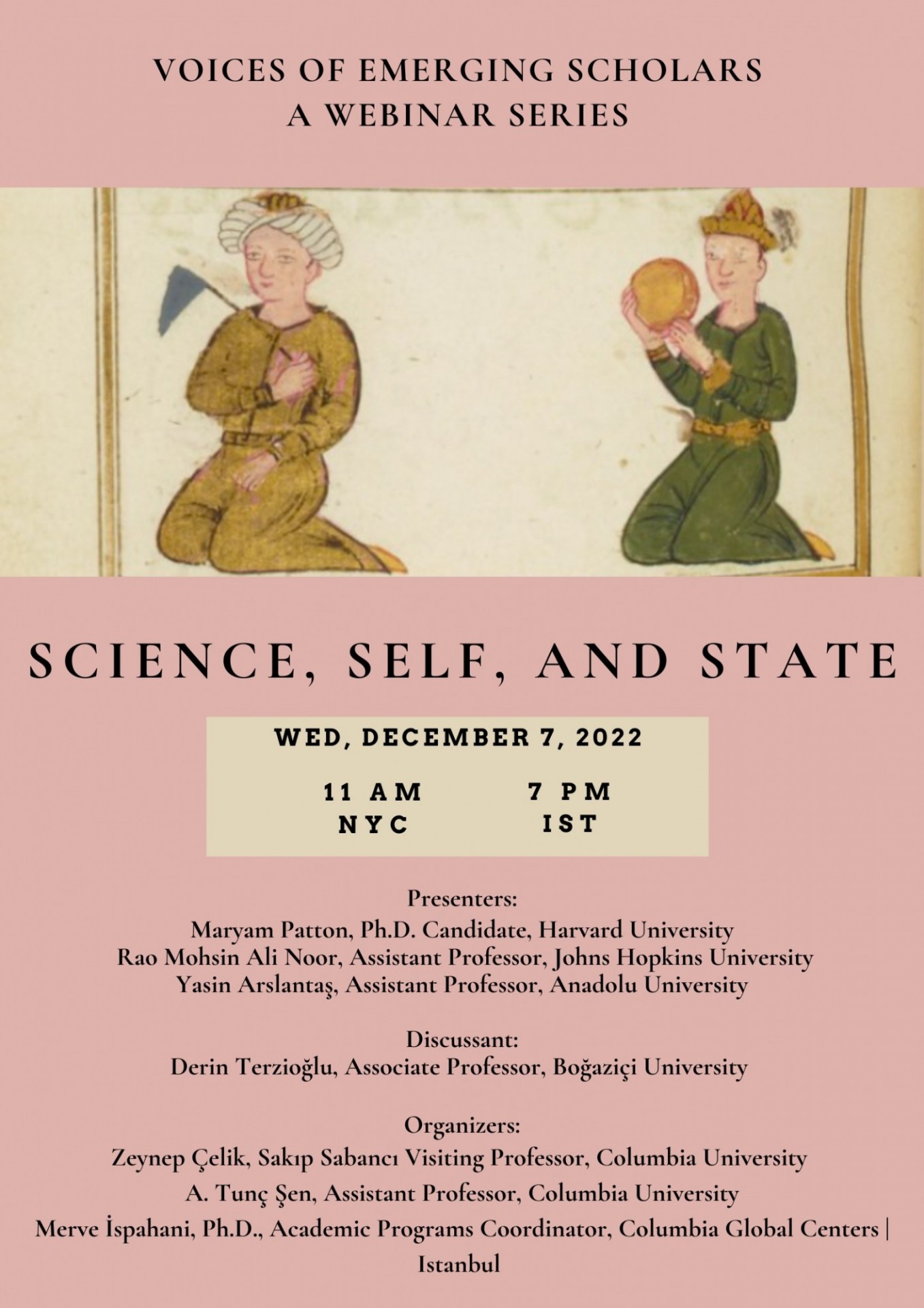
Watch the video here.
This session of the webinar series shifted the focus toward early modern Ottoman realities. From the authority of astrologers as history writers to the dream narratives of sultans and debates on kingship and state formation, papers offered fresh insights into the socio-political and cultural history of the early modern Ottoman empire.
Maryam Patton is a Ph.D. candidate in the dual History and Middle Eastern Studies program at Harvard University. Her dissertation focuses on the social and cultural history of time in fifteenth- and sixteenth-century Istanbul and Venice. Her broader interests lie in cross-cultural transmission in the Early Modern Mediterranean, especially in the fields of book history and the history of science. She received her MPhil in European History in 2016 from Oxford, where she was an Ertegun Scholar. She holds a BA in History from Princeton.
Rao Mohsin Ali Noor was born and raised in Lahore, Pakistan, and received a BA (Hons) in History from the Lahore University of Management Sciences (LUMS) in 2014. He received his doctorate in Near Eastern Languages and Civilizations (NELC) from the University of Chicago in 2022 and is currently an assistant professor of History at Johns Hopkins University. His current book project, titled Cosmic Sovereignties: The Embodied Turn in Ottoman Religion and Politics, explores the transformation of early modern Ottoman religio-political and religio-social thought and practice between the late 16th and early 18th centuries.
Yasin Arslantaş received his Ph.D. in Economic History from the London School of Economics in 2018, and his M.A. in History from Bilkent University in 2013. He is currently teaching economic history at Anadolu University. Specializing in social and economic history broadly defined, his earlier work focused on religio-political discourse, the political economy of confiscations, and religious conversion in the Ottoman Empire. Among his current interests are the production and dissemination of useful knowledge and the rise of mass education in the late Ottoman Empire and early republican Turkey.
Discussant:
Derin Terzioğlu received her Ph.D. from Harvard University in 1999 and is an Associate Professor of History at Boğaziçi University in Istanbul, Turkey. She has published various articles on early modern Ottoman religious, cultural and intellectual history and co-edited, together with Tijana Krstić, two collective volumes, Historicizing Sunni Islam in the Ottoman Empire, c. 1450-c.1750 (Brill, 2021) and Entangled Confessionalizations? Dialogic Perspectives on the Politics of Piety and Community-Building in the Ottoman Empire, 15th -18th Centuries (GorgiasPress, 2022). She is also one of the editors of Brill’s “Ottoman Empire and Its Heritage” (OEH) series.
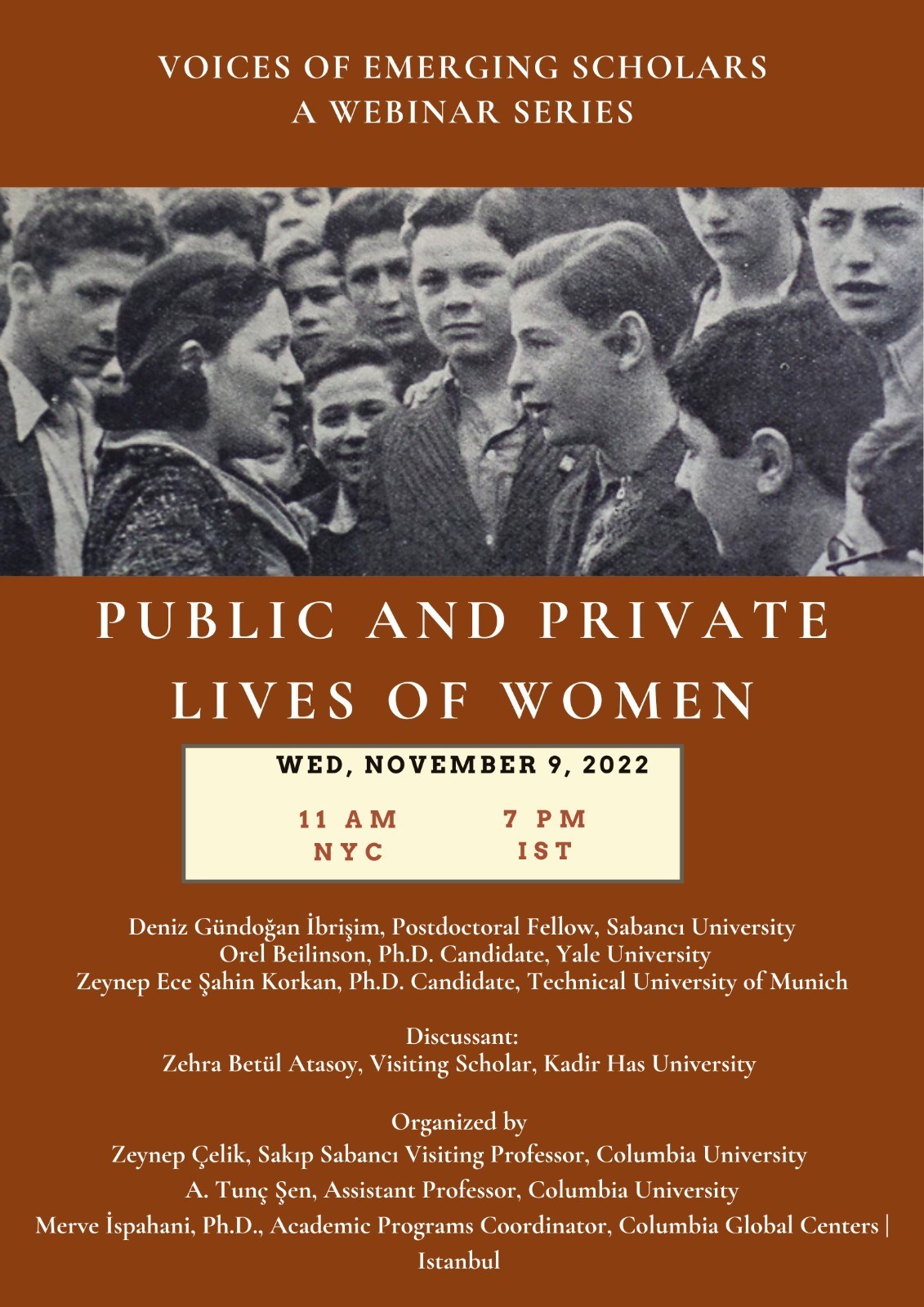
Watch the video here.
The presenters talked about everyday lives of Ottoman women during the late nineteenth and early twentieth centuries. Orel Beilinson, Ph.D. candidate at Yale University, refered to the lives of domestic servants in Ottoman households, some of which were unpaid workers for life. Zeynep Ece Şahin Korkan, Ph.D. candidate at Technical University of Munich, discussed the gendered spaces of Istanbul, with a particular focus on the Red Crescent Exhibition of 1917. And lastly, Deniz Gündoğan İbrişim, postdoctoral fellow at Sabancı University, took Suat Derviş’s cultural and literary world as a case study to map Istanbul’s “ruin and ruination” from Derviş’s eyes.
Deniz Gündogan İbrişim is a Marie Skłodowska Curie Postdoctoral Fellow at Sabancı University, at the Faculty of Arts and Social Sciences (SU Gender). She received her BA in English Literature from Istanbul University and two MA degrees in Gender Studies respectively from Istanbul University and Central European University. As a Fulbright Ph.D. Fellow, she completed her Ph.D. in Comparative Literature from Washington University in St. Louis with her dissertation entitled “Trauma, Survival and Survivance in Contemporary Anglophone and Turkish Literature: Materiality Beyond Mind.” As a comparatist literary scholar, Gundogan Ibrisim specializes in cultural trauma and memory studies, gender and sexuality studies, postcolonial theory, 20th and 21st century literature, and environmental humanities. She is the co-author of Gaflet: Modern Türkçe Edebiyatın Cinsiyetçi Sinir Uçları (2019, Metis).
Orel Beilinson is a Ph.D. Candidate in modern Europe and Eurasian history at Yale University. He is currently a junior visiting fellow at the Institute for Human Sciences in Vienna, where he is completing a dissertation titled “Tomorrow Belongs to Me: Coming-of-Age in the Other Europe.” A comparative historian with wide-ranging linguistic capabilities, Orel works on the social and cultural history of labor, education, and the family in Europe, the Middle East, and Central Asia. His most recent publications are “Social Stratification and Career Choice Anxieties in Nineteenth-Century Central Europe” (Journal of Social History) and “What is Austro-Hungarian History to the Eurasianist?” (forthcoming in the Journal of Austrian Studies).
Zeynep Ece Şahin Korkan is a Ph.D. candidate at the Technical University of Munich, Chair of History of Architecture and Curatorial Practice. Her fields of interest include medicine, gender, and architecture intersection, environmental discourse in architectural history, and the spatial history of museums and display spaces. Currently, she is working on her doctoral research on the late Ottoman medical spaces. Prior to this, Zeynep studied architecture at METU, and her master's thesis, "Displaying the Body: Anatomy Museum and Anatomical Expressions in Architecture," explored the relations between architecture and the human body within the spatial context of anatomy museums, anatomical theaters, and medical displays.
Discussant:
Zehra Betül Atasoy holds a Ph.D. in Urban Systems-History, from a joint degree program at the New Jersey Institute of Technology and Rutgers University. She received her bachelor’s degree in architecture and her master’s degree in the history of architecture from Istanbul Technical University. Her research focuses on the urban quotidian practices of women and the lived experience of health in the urban environment of early Republican Turkey. She is currently a lecturer at Kadir Has University, Faculty of Art and Design.
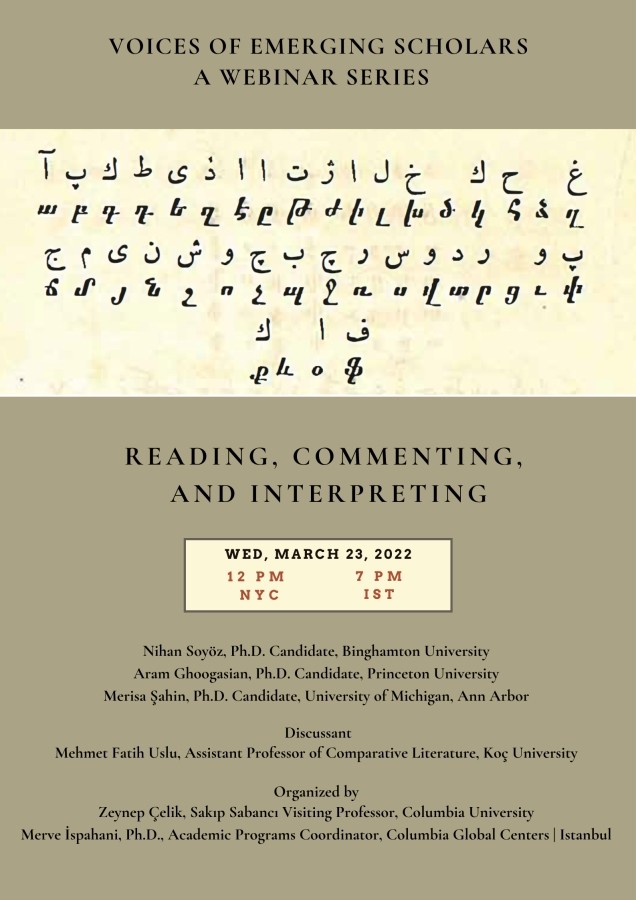
Watch the video here.
Aziz Efendi’s Muhayyelât: Adaption and Literary Modernity
Nihan Soyöz is a doctoral candidate in Comparative Literature at Binghamton University and a doctoral fellow at the Institute for Advanced Studies in the Humanities in the same university. She received her MA in Turkish Literature from Bilkent University in Ankara. She was awarded a Fulbright grant in 2017. Her dissertation examines the development and conceptualization of Ottoman-Turkish literary modernity through a discussion of Muhayyelât (1796) by Giritli Aziz Efendi, employing a world-oriented perspective and methodology.
What We Talk About When We Talk About Armeno-Turkish
Aram Ghoogasian is a doctoral candidate in Near Eastern Studies at Princeton University. His dissertation focuses on the impact of the industrialization of print on Armenian language and culture in the mid-nineteenth century. He earned his MA in Middle Eastern Studies from the University of Chicago in 2019 and bachelor's degrees in English and History from UCLA in 2016. His writing has appeared in Études arméniennes contemporaines, the Los Angeles Review of Books Quarterly Journal, and the New York Times.
Ahmed Rıza Bey’s Positivist and Anticolonial World Order
Merisa Şahin is a doctoral candidate in the department of Political Science at the University of Michigan, Ann Arbor. She holds a BA in Political Science and Sociology from Bogazici University, and an MA from New York University. Her interests lie in the fields of comparative political theory, postcolonial and critical theory, with a focus on late Ottoman political thought. Her current research examines Ahmed Rıza Bey and the implications of his spin on Comtean positivism.
Discussant:
Mehmet Fatih Uslu is an assistant professor of comparative literature at Koç University. He is the author of Çatışma ve Müzakere: Osmanlı’da Ermenice ve Türkçe Dramatik Edebiyat (Conflict and Negotiation: Armenian and Turkish Dramatic Literature in the Ottoman Empire) (2014). He is the co-editor of Tanzimat ve Edebiyat: Osmanlı İstanbul’unda Modern Edebi Kültür (Tanzimat and Literature: Modern Literary Culture in the Ottoman Istanbul), with Fatih Altuğ (2014). He has translated numerous works of literature and humanities from Armenian, English, and Italian into Turkish.
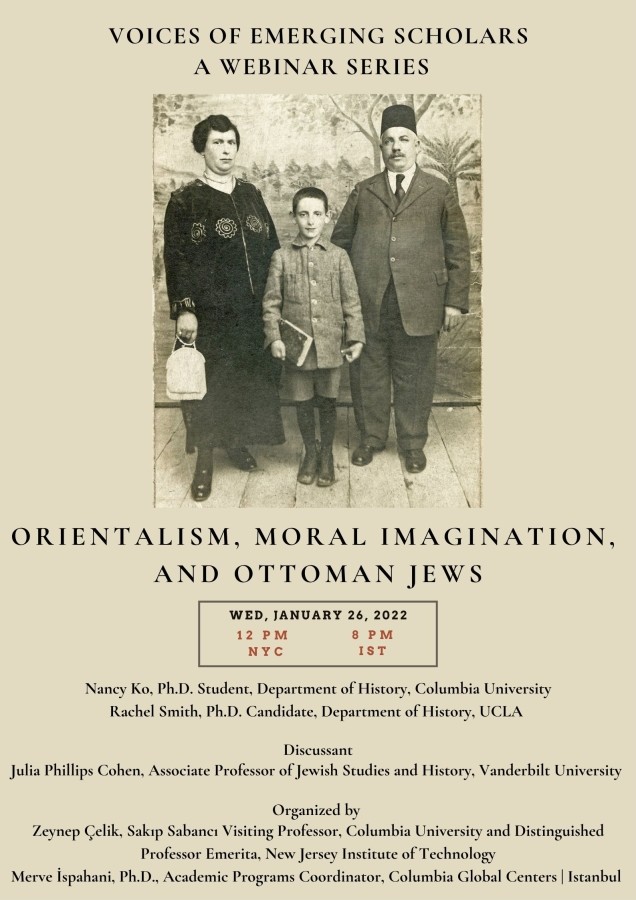
Watch the video here.
Scenes of Coexistence: Racial Capitalism and Historical Amnesia in Ottoman Rhodes
Nancy Ko is a third-year Ph.D. student in the Department of History at Columbia University and a recipient of the Paul & Daisy Soros Fellowship for New Americans. She is a historian of Jewish life, loss, and memory in the Middle East. Her dissertation reevaluates the legacies of the Alliance Israélite Universelle, a French-Jewish educational organization founded in 1860 to "regenerate" the Jews of the "Orient." She can be heard in conversation with recent authors in History, Critical Theory, and Jewish and Middle East Studies over at the New Books Network.
Mapping the Racial Terrain of Ottoman Sephardic Travelogues
Rachel E. Smith is a doctoral candidate in History at UCLA. She focuses on the history and politics of knowledge production and representation among Sephardic communities in the late Ottoman Empire. Against the backdrop of expanding empires, the rise of anthropology, and shifting notions of race, her research examines how Sephardic writers and thinkers developed, circulated, and mobilized ethnographic and racialized knowledge to serve various reformist ideologies. She received a BA/MA in Linguistic Anthropology from New York University and completed a dual-degree MA in Jewish History and Education at the Jewish Theological Seminary.
Discussant:
Julia Phillips Cohen is an Associate Professor of History and Jewish Studies at Vanderbilt University. She is the author of Becoming Ottomans: Sephardi Jews and Imperial Citizenship in the Modern Era (Oxford University Press, 2014), together with Sarah Abrevaya Stein, Sephardi Lives: A Documentary History, 1700-1050 (Stanford University Press, 2014). Her articles have appeared in the International Journal of Middle East Studies, Jewish Social Studies, Jewish Quarterly Review, AJS Perspectives, and American Historical Review. She is currently working on a new project on Jewish women’s lives in the late Ottoman Empire.
Organized by:
Zeynep Çelik, Sakıp Sabancı Visiting Professor of Turkish Studies, Columbia University and Distinguished Professor Emerita, New Jersey Institute of Technology
Merve İspahani, Ph.D., Academic Programs Coordinator, Columbia Global Centers | Istanbul
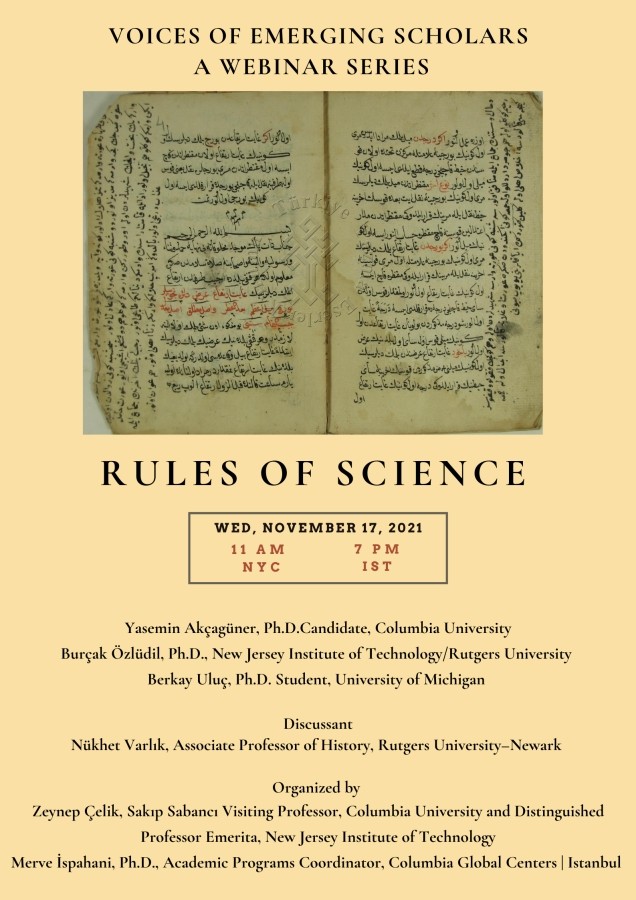
Watch the video here.
Looking for Love and Loss on the Margins of an Ottoman Timekeeping Manuscript
Yasemin Akçagüner is a fourth-year Ph.D. Candidate in the History department at Columbia University. She studies the history of science, medicine and temporality in the eighteenth and nineteenth centuries Ottoman Empire. Her dissertation, tentatively titled "Celestial Bodies: Astral Science, Medicine and the Ottoman Lifecycle (1768-1839)” investigates the ways Ottomans imagined their futures and wrote about their hopes and anxieties in the marginalia of scientific manuscripts at the turn of the nineteenth century.
Temporal Scales: Understanding Change in a Medical Institution
Burçak Özlüdil is an architectural historian whose research focuses on the intersection of psychiatry/medicine, urban/architectural space, and uses of digital tools in these fields. She holds a Ph.D. in Urban Systems from NJIT and Rutgers University. Her dissertation, entitled “Madness and Empire: The Ottoman Asylum, 1830-1930,” was shortlisted for the BRAIS-De Gruyter 2019 Prize in Islamic Studies. Burçak is the co-founder of SpatioScholar, a scholarly digital platform for temporospatial analysis. Her research received support from the Social Science Research Council, Turkish Cultural Foundation, and Getty Foundation. She teaches courses on architectural history, medical history, and digital humanities.
“The Science of Beauty”: Aesthetics and Ottoman Orientalism
Berkay Uluç is a Ph.D. student in the Department of Comparative Literature at the University of Michigan. He received his B.A. in Political Science and International Relations from Boğaziçi University and his M.A. in Cultural Studies from Sabancı University. His research is concerned with late Ottoman literary modernities with a particular focus on Turkish and Arabic contexts. Among his other research interests are postcolonial studies, translation studies, world literature, and aesthetics and politics.
Discussant:
Nükhet Varlık is Associate Professor of History at Rutgers University–Newark. She is a historian of the Ottoman Empire interested in disease, medicine, and public health. She is the author of award-winning Plague and Empire in the Early Modern Mediterranean World: The Ottoman Experience, 1347–1600 (2015) and editor of Plague and Contagion in the Islamic Mediterranean (2017). Her new book project, “Empire, Ecology, and Plague: Rethinking the Second Pandemic (ca.1340s-ca.1940s),” examines the six-hundred-year Ottoman plague experience in a global ecological context. She is the Editor of the Journal of the Ottoman and Turkish Studies Association (JOTSA).
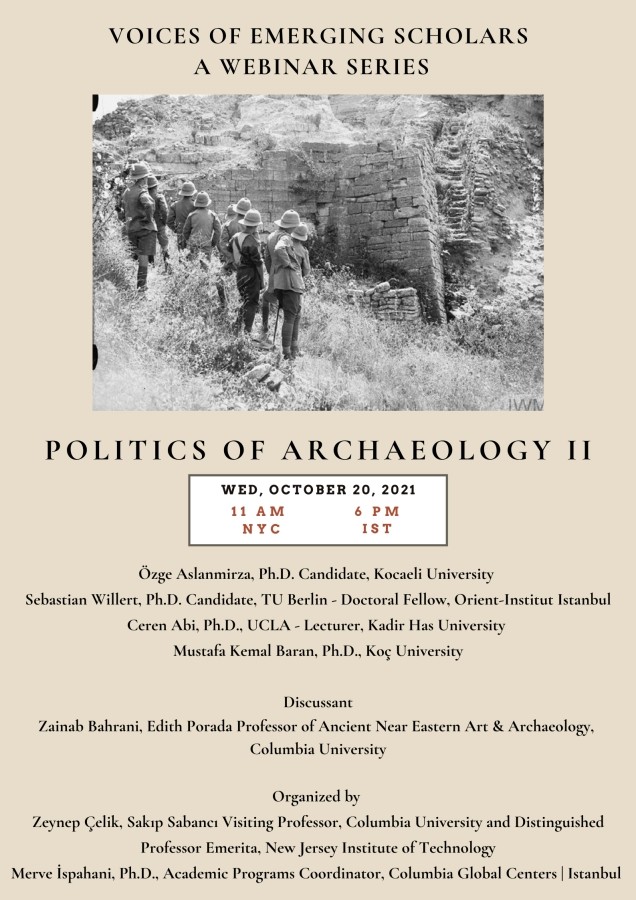
Watch the video here.
Rising in Politics through Archaeology: The Case of Mark Sykes
Özge Aslanmirza graduated from the Department of Foreign Language Education of Middle East Technical University in 2014. She fulfilled the requirements of her minor degree in the Department of History at the same university. In 2017, she submitted his master’s thesis on the scholarship of the Turkish Historical Foundation. She completed her first year in the doctorate program at Binghamton University with Fulbright Scholarship. She proceeds her Ph.D. at the Department of History of Kocaeli University on the scholarship of TÜBİTAK. She works there as a research assistant. In her Ph.D. thesis, she focuses on knowledge production of the British Empire in the Ottoman Middle East.
A Collection on Sale: The German-Ottoman Secret Museum Negotiations in Istanbul, 1912–1914
Sebastian Willert is Doctoral Fellow at Orient-Institut Istanbul and a Ph.D. candidate at TU Berlin. He earned a Master’s in History with a thesis on the German-Turkish Commando for Monument Protection. His dissertation analyses the role of antiquities as a matter of conflict within the German-Ottoman Art Policy between 1898 and 1918. He worked and published on the overlapping or rivaling aims and agendas of German and Ottoman archaeology, military, politics, and diplomacy. His research focuses on the valorization, instrumentalization, and translocation of cultural assets within the 19th and 20th centuries with a regional emphasis on the Ottoman Empire.
The Impact of the First World War on Archaeology in the Ottoman Empire
Ceren Abi received her Ph.D. from History at UCLA in 2019, her M.A in European History at Leiden University with a special Europaeum Program with Sorbonne, Paris I and Oxford University). She is working on the cultural and social history of the Middle East and North Africa, the late Ottoman Empire, the First World War, and the cultural heritage especially in times of armed and social conflict. She is curenty a visiting scholar at Kadir Has University.
Local Communities and Labour in the History of Archaeology in Turkey Institution
Mustafa Kemal Baran recently completed his Ph.D. at the Archaeology and History of Art Department, Koç University, Istanbul. He holds a bachelor’s degree in Industrial Design and a master’s degree in Architectural History from the Middle East Technical University, Ankara. He completed another master’s degree in Classical Archaeology at the University of Oxford where he held the Ertegun Graduate Scholarship in the Humanities. His research focuses on the history of archaeological practice and heritage in Turkey with a particular interest in local communities and labor.
Discussant:
Zainab Bahrani is the Edith Porada Professor of Art History and Archaeology at Columbia University. She specializes in Ancient Western Asian and East Mediterranean art and archaeology as well as art theory, historiography, and philosophies of representation. In addition to these subjects, professor Bahrani has also written on the destruction of Iraqi cultural heritage and was a Senior Advisor to Iraq’s Ministry of Culture in 2004. Monument preservation and conservation is also a focus of her work and she currently directs the survey project Mapping Mesopotamian Monuments.
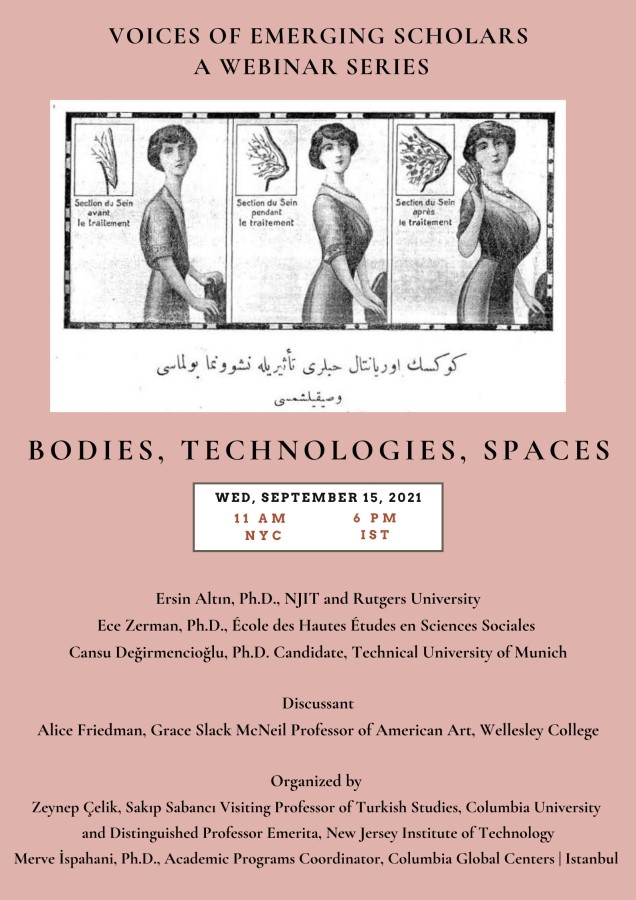
Columbia Global Centers Istanbul invites you to a series of webinar workshops to highlight the research of emerging scholars in the late Ottoman and early Turkish Republican history. Organized by Professor Zeynep Çelik, our eightht workshop, "Bodies, Technologies, Spaces," explores the impact of new technologies on everyday life at home from the 1880s to the 1930s.
More information on the program is below.
Watch the video here.
Marketing Orient: Pilules Orientales and Feminine Body in Fin-de-Siècle Istanbul
Ersin Altın is an architect by training. He earned his master’s degree in History and Theory of Architecture. He completed his doctoral studies in the Urban Systems, joint Ph.D. program of New Jersey Institute of Technology and Rutgers University. His work is situated at the intersection of urban studies, history, and digital technologies. His research focuses on everyday life in the late Ottoman period with an emphasis on the changes in the perception of the body, home, and the city through historical analysis of the material world. He is currently a Visiting Assistant Professor of History of Art and Design at Pratt Institute. He also teaches history/theory survey courses and design studio courses at New Jersey Institute of Technology and Rutgers University.
Personal Spaces as Showcases: Interior Photography in the First Decades of Twentieth Century
Ece Zerman received her Ph.D. in history at the École des Hautes Études en Sciences Sociales (EHESS) Paris and is an associate member of the Center for Turkish, Ottoman, Balkan, and Central Asian Studies (CETOBaC) at EHESS. She holds MA and M.Res. degrees from the history departments of Boğaziçi University and the European University Institute in Florence. Based on her master thesis, she conceptualized an exhibition at SALT Research, “Dismantling the Archive: Representation, Identity, Memory in an Ottoman Family.” She taught at INALCO (Institut National des Langues et Civilisations Orientales), Paris and at Strasbourg University. Her research focuses on social and cultural history of the late Ottoman Empire and early Republic of Turkey, with a particular interest in personal narratives, photography, and domestic interiors.
Healthy Homes: Hygiene, Disease Prevention, and Domesticity During the 1930s in Turkey
Cansu Değirmencioğlu is a doctoral candidate at the Technical University of Munich, the Chair of History of Architecture and Curatorial Practice. She received her bachelor’s degree in Interior Architecture and her master’s degree in Architectural History at Istanbul Technical University. She is currently residing and carrying her studies in Berlin and working on her dissertation titled “Prescribed Modernity: The Impact of Health and Hygiene Concerns on Turkish Architecture During the Early Republican Era”, funded by the DAAD doctoral scholarship. Her scholarly research focuses on the intertwined histories of hygiene, medicine and modern architecture, and history of lighting design.
Discussant:
Alice Friedman the Grace Slack McNeil Professor Of American Art and co-director of the Architecture Program at Wellesley College. She is the author of numerous books and articles on the history of architecture, focusing on domesticity, gender, and sexuality, including Women and the Making of the Modern House (1998) and American Glamor and the Evolution of Modern Architecture (2010). Her current projects include a book-length study of queer New York in the 1920s and ‘30s, and a series of in-depth case studies that explore the idea that modern architecture, which comes in many different shapes and sizes-designed to accommodate non- conforming households and sexualities, does not look ‘modern’ at all.
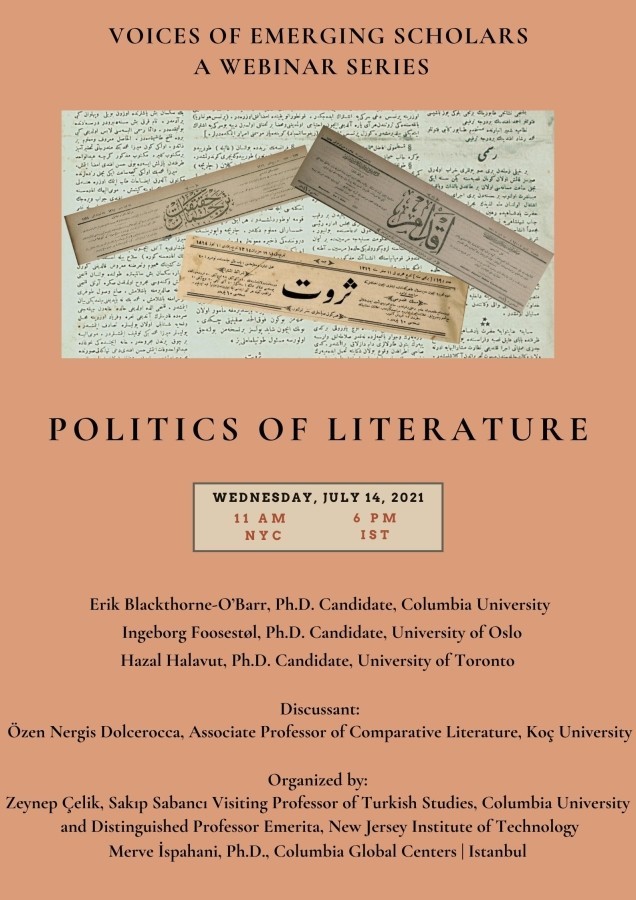
Our seventh workshop "Politics of Literature" will discuss the engagement of literary figures in the turbulent politics of the turn-of-the-century.
Watch the program here.
More information on the program is below.
Columbia Global Centers Istanbul invites you to a series of webinar workshops to highlight the research of emerging scholars in the late Ottoman and early Turkish Republican history. Organized by Professor Zeynep Çelik, our seventh workshop "Politics of Literature" will discuss the engagement of literary figures in the turbulent politics of the turn-of-the-century.
Passing as Persian: Alterity and Desire in Ahmet Mithat Efendi’s Dürdane Hanım
Erik Blackthorne-O’Barr is a Ph.D. Candidate in the Department of Middle Eastern, South Asian, and African Studies at Columbia University, currently focusing on Ottoman depictions of Iran and sanitary discourse during the nineteenth century. He received an M.A. degree in Turkish Studies from Sabancı University and a B.A. from the Department of Near and Middle Eastern Civilizations at the University of Toronto.
The Shaping of a Reading Public: Lofty Ideals Meet Print Economy in the Late 19th Century Ottoman Press
Ingeborg Foosestøl is a Ph.D. Candidate in the History Department at the University of Oslo. She specializes in late Ottoman intellectual history, with a focus on reading public(s), multilingualism, and the connections between literature, theater, and the press. Fossestøl has studied at the University of Oslo, Boğaziçi University, and Université de Montréal. She translated novels by Orhan Pamuk, Burhan Sönmez, and Aslı Erdoğan into Norvegian.
Halide Edib, Collective Loss and the Lost Witness
Hazal Halavut is a Ph.D. Candidate at the University of Toronto’s Women & Gender Studies Institute. Her research focuses on the collective trauma, memory, the aesthetics of mourning, and the literary representations of the Armenian Genocide. She lectured and published on state violence and collective memory in Turkey, specifically on the 1980 military coup, sexual violence under custody, and women’s resistance practices. She is a writer and co-editor for the online feminist journal 5Harfliler.
Discussant:
Özen Nergis Dolcerocca is an Associate Professor of Comparative Literature at Koç University. She received her doctoral degree in Comparative Literature from NYU in 2016. Her work focuses on comparative modernisms, narrative theory, literature of the Near East, critical theory, and digital humanities. She is the author of Self and Desire in Modern Turkish Novel and the guest editor of the special issue in the Journal of Middle Eastern Literatures entitled “Beyond World Literature: Reading Ahmet Hamdi Tanpınar Today.” She received the 2020 European Research Council (ERC) Starting Grant for her project “Modernizing Empires: Enlightenment, Nationalist Vanguards and Non-Western Literary Modernities.”
Organized by:
Zeynep Çelik, Sakip Sabanci Visiting Professor of Turkish Studies and Distinguished Professor Emerita, New Jersey Institute of Technology
Merve İspahani, Ph.D., Columbia Global Centers | Istanbul
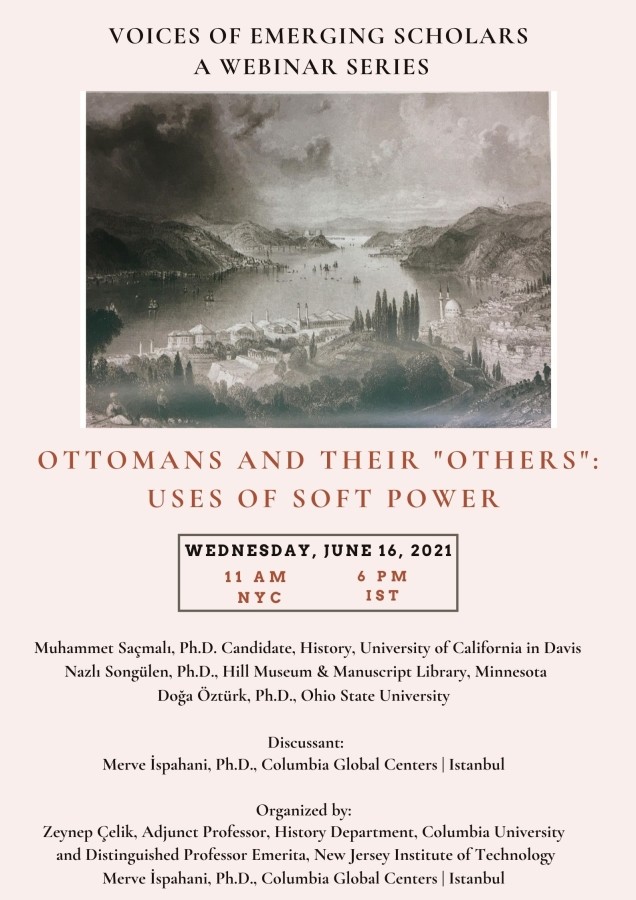
Our sixth workshop, "Ottomans and their "Others": Uses of Soft Power," looks at how different control and manipulation mechanisms functioned in the early and late modern Ottoman Empire.
Watch the video here.
More information on the program is below.
Columbia Global Centers Istanbul invites you to a series of webinar workshops to highlight the research of emerging scholars in the late Ottoman and early Turkish Republican history. Organized by Professor Zeynep Çelik, our sixth workshop, "Ottomans and their "Others": Uses of Soft Power," looks at how different control and manipulation mechanisms functioned in the early and late modern Ottoman Empire.
A Raison d’État of the Ottoman Universal Caliphate: Protecting Shi’ite Safavids
Muhammet Saçmalı is a Ph.D. candidate in History at the University of California in Davis. He will defend his dissertation, “Early Modern Ottoman Universal Caliphate and Sunni-Shi'ite Political Relations in the First Half of the 18th Century," in the coming months. Muhammet graduated from Boğaziçi University with a double major in Sociology and Political Science and International Relations in 2010. He holds an MA in Political Science and International Relations from the same university with a thesis titled “Compliance and Negotiation: The Role of the Turkish Diyanet in the Production of Friday Khutbas.” Between 2010 and 2014, he worked as a personal assistant for the late Şerif Mardin in his book project on the Enlightenment Era.
Development of the Beylerbeyi Neighborhood, Settlement Policies
Nazlı Songülen studied urban planning at the Middle East Technical University in Ankara, specializing in urban design. She then shifted to history and completed her doctoral dissertation in the History and Civilization Department of the European University Institute in Florence, Italy, in October 2020. Her dissertation, titled “Distant Land of the Byzantine Holy Golden Cross in Early Modern Ottoman Istanbul: From the Istavros Waqf-Village and Royal Garden to the Beylerbeyi Neighbourhood on the Shores of the Bosphorus,” investigates the transformation of the Istavros-Beylerbeyi shores in early modern Ottoman Istanbul by focusing on the changing land distribution policies and endowment practices on royal gardens. She currently works as a cataloguer in Hill Museum & Manuscript Library in Minnesota, USA.
Philanthropy and Self-Identification in Late Ottoman Egypt
Doğa Öztürk received his Ph.D. from the Ohio State University’s Department of History in August 2020. His dissertation, “‘Remembering’ Egypt’s Ottoman Past: Ottoman Consciousness in Egypt, 1841-1914,” analyzes the prevalence of Ottoman consciousness in Egypt at a time when Egypt was gaining more political and economic autonomy from the Ottoman Empire, and when a more distinct sense of Egyptian national identity was developing. His research focuses broadly on the relationship between memory and nation, as well as the interplay between imperial cultures and national identities. Currently, he is working on an article on Kadriye Hüseyin, a largely forgotten female intellectual and a member of the Egyptian ruling family, who played an active role in the wider Ottoman cultural world in the early 20th century.
Discussant:
Merve Ispahani is Academic Programs Coordinator at Columbia Global Centers | Istanbul. Merve received her doctoral degree from Columbia University, Department of History. Her dissertation “Building Sovereignty in the Late Ottoman World: Imperial Subjects, Consular Networks and Documentation of Individual Identities” examines the formation of Ottoman sovereignty in the nineteenth and early twentieth centuries at the disciplinary intersection of international law and history. Merve holds Master of Arts and Bachelor of Arts degrees from Boğaziçi University.
Organized by:
Zeynep Çelik, Adjunct Professor, History Department, Columbia University and Distinguished Professor Emerita, New Jersey Institute of Technology
Merve İspahani, Ph.D., Columbia Global Centers | Istanbul
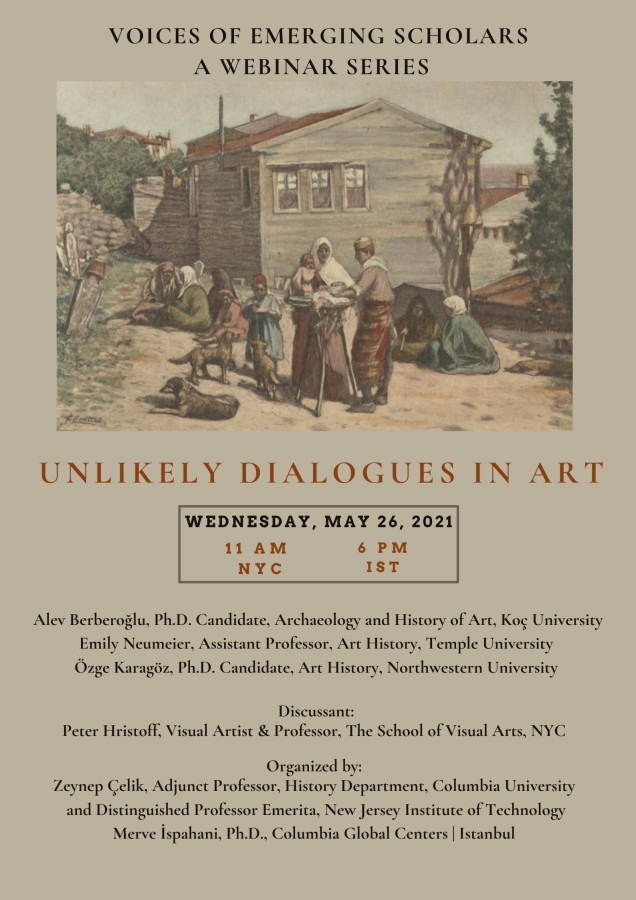
Our fifth workshop, "Unlikely Dialogues in Art," turns to artistic production in comparative context.
Watch the video here.
More information on the program is below.
Dynamics of an Artistic Duo: Reciprocal Influences Between Elisa and Fausto Zonaro
Alev Berberoğlu is a Ph.D. candidate in the Department of Archaeology and History of Art at Koç University. Her dissertation, titled “Unwritten Histories of Photography: Elisa Zonaro, an Italian Photographer in Ottoman Istanbul,” explores the work of a photographer active in the Ottoman capital at the end of the nineteenth century. Berberoğlu’s doctoral research concentrates on photography in the Ottoman Empire, and women’s experiences, ways of visual expression, and multicultural social life in nineteenth-century Istanbul.
Citation as Nation Building in the Paintings of Cemal Tollu
Emily Neumeier is an Assistant Professor of Art History at Temple University. Her research concerns the art and architecture of the Islamic world, particularly from the Ottoman Empire and the Turkish Republic. Before coming to Temple, Neumeier taught at Ohio State University and was a Research Collaborator in the Max Planck Research Group “Objects in the Contact Zone: The Cross-Cultural Lives of Things” at the Kunsthistorisches Institut in Florence.
Redistributing Artistic Values in the New Turkey: The 1934–35 Exhibition of Soviet Art
Özge Karagöz is a Ph.D. Candidate in Art History at Northwestern University. Her research concentrates on transregional histories of modern art with an emphasis on artistic mobility along the Turkish-French-Soviet axis in the first half of the twentieth century. Her forthcoming dissertation is titled “Refiguring Modernism at the Limits of Europe: Turkish-Soviet Exchanges, 1923-1950.” In 2020–21, she was a fellow in Northwestern University's Paris Program in Critical Theory.
Discussant:
Peter Hristoff is a visual artist working in painting, printmaking, drawing, and rug making. Recent exhibition venues have included the MoMA (NY), C.A.M. Gallery Istanbul, Duke House NYU, and The Hammond Museum in North Salem, NY. In 2005 Peter had a solo exhibition of his rugs at The Museum of Aya Sofya and he was selected as the first visual artist-in-residence at The Metropolitan Museum of Art in 2015/16. He has been exhibiting in Turkey since 1997 and will present Legacy: The Hristoff Family Archives at Yapi Kredi Cultural Center in 2022. Peter is part of the BFA Faculty of his alma-mater The School of Visual Arts. Peter's paintings and works on paper are in numerous public and private collections, including The Metropolitan Museum of Art, The Moscow Museum of Modern Art, MoMA in NY, American Express, and Yapi Kredi Bank. Peter currently has a studio in Bethel, CT, and in NYC.
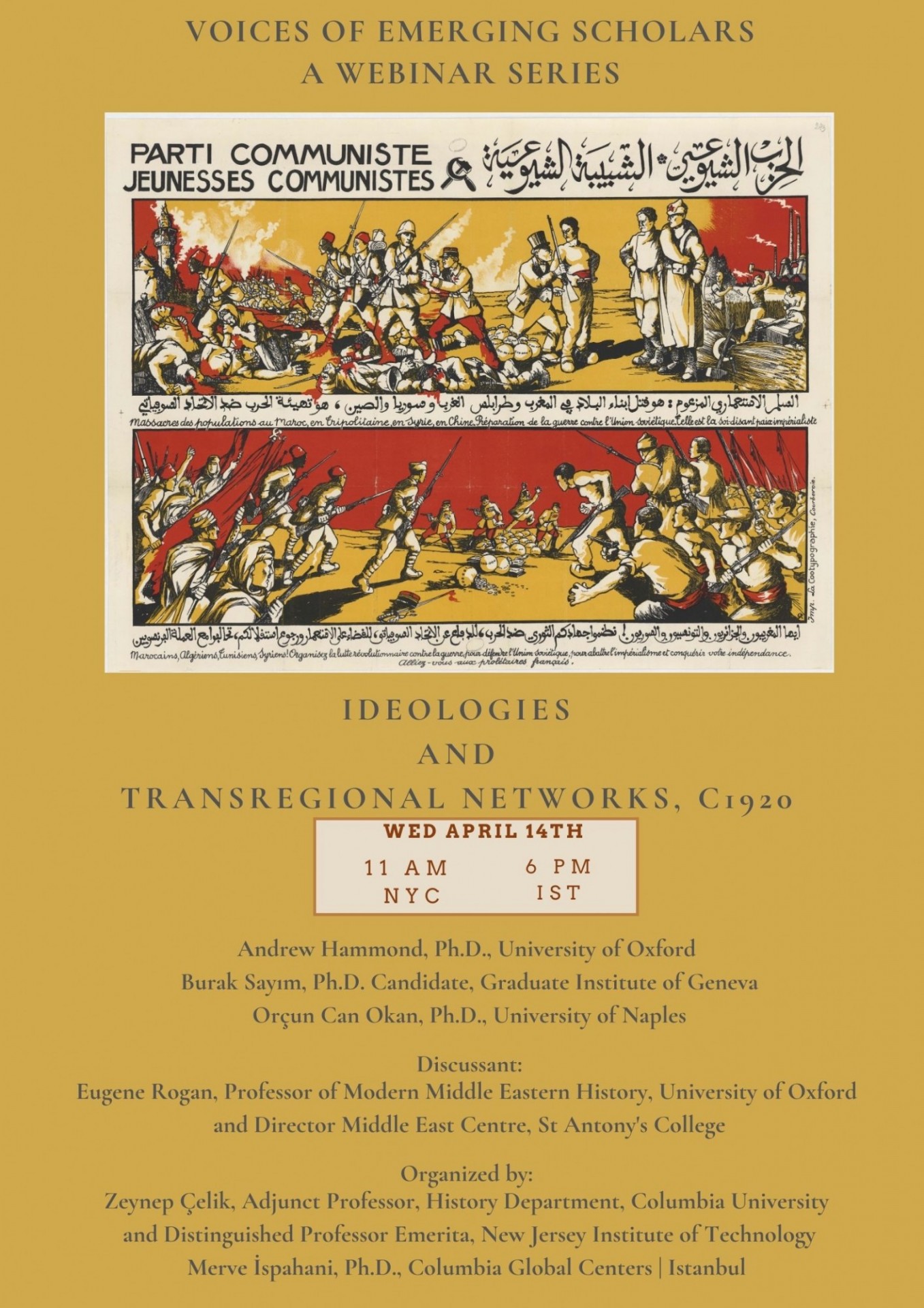
Our fourth workshop, "Ideologies and Transregional Networks, c1920," turns to Islamic modernism, communism, and the interlinked project of nation-building in the Middle East.
More information on the program is below.
Watch the video here.
"Response to the Anglican Church": Late Ottoman Islamicists at the Inception of the Turkish Republic
Andrew Hammond
Andrew Hammond obtained his doctorate from the University of Oxford in 2020 for his thesis “Interactions between Turkish and Egyptian Islamic Thinkers from 1908 to 1952: Modernity and the Disruption of Islamic Knowledge.” The manuscript is currently at the peer review stage for publication. Dr. Hammond studied Arabic and early Islamic History with Gerald Hawting at SOAS and Modern Middle East Studies and Turkish at Oxford, and previously worked as a journalist for Reuters in Egypt and Saudi Arabia. Over the past year, he has taught Late Ottoman and Modern Turkish History and Turkish Political and Cultural Texts at Oxford.
Beyond Borders: An Entangled History of Communism in the post-Ottoman Middle East
Burak Sayım
Burak Sayım is a Ph.D. Candidate at the International History Department of the Graduate Insitute, Geneva. He completed his Bachelor’s degree at the University of Istanbul and his Master’s degree at the University of Sorbonne-Nouvelle in Paris. He is currently working on his doctoral dissertation, provisionally titled “Transnational Communist Networks in the Post-WWI Middle East: Anti-Colonialism, Internationalism and Itinerant Militancy (1919-1928),” under the supervision of Prof.Cyrus Schayegh.
The Treaty of Lausanne and the Construction of the Arab East
Orçun Can Okan
Orçun Okan received his Ph.D. in History from Columbia University in May 2020, with a dissertation titled "Coping with Transitions: The Connected Construction of Turkey, Syria, Lebanon, and Iraq, 1918-1928.” He is currently a postdoctoral research fellow in the field of Global History and Governance at the University of Naples in Italy. His work has been supported by the Istanbul Research Institute as well. Dr. Okan’s research combines methods of diplomatic history with social history in order to analyze questions of nationality and citizenship, imperial collapse, and state succession in the aftermath of World War I.
Discussant:
Eugene Rogan is a Professor of Modern Middle Eastern History at the University of Oxford and a Fellow of St Antony’s College, where he serves as Director of the Middle East Centre. He was elected a Fellow of the British Academy in 2017. He took his BA in economics from Columbia and his MA and Ph.D. from Harvard in History and Middle Eastern Studies. His work focuses on the history of the Arab world from the late Ottoman era to modern times. He is the author of Frontiers of the State in the Late Ottoman Empire: Transjordan, 1851-1920 (1999); The Arabs: A History (2009, 2017) and most recently, The Fall of the Ottomans: The Great War in the Middle East, 1914-1920 (2015). His books have been translated in 18 languages.
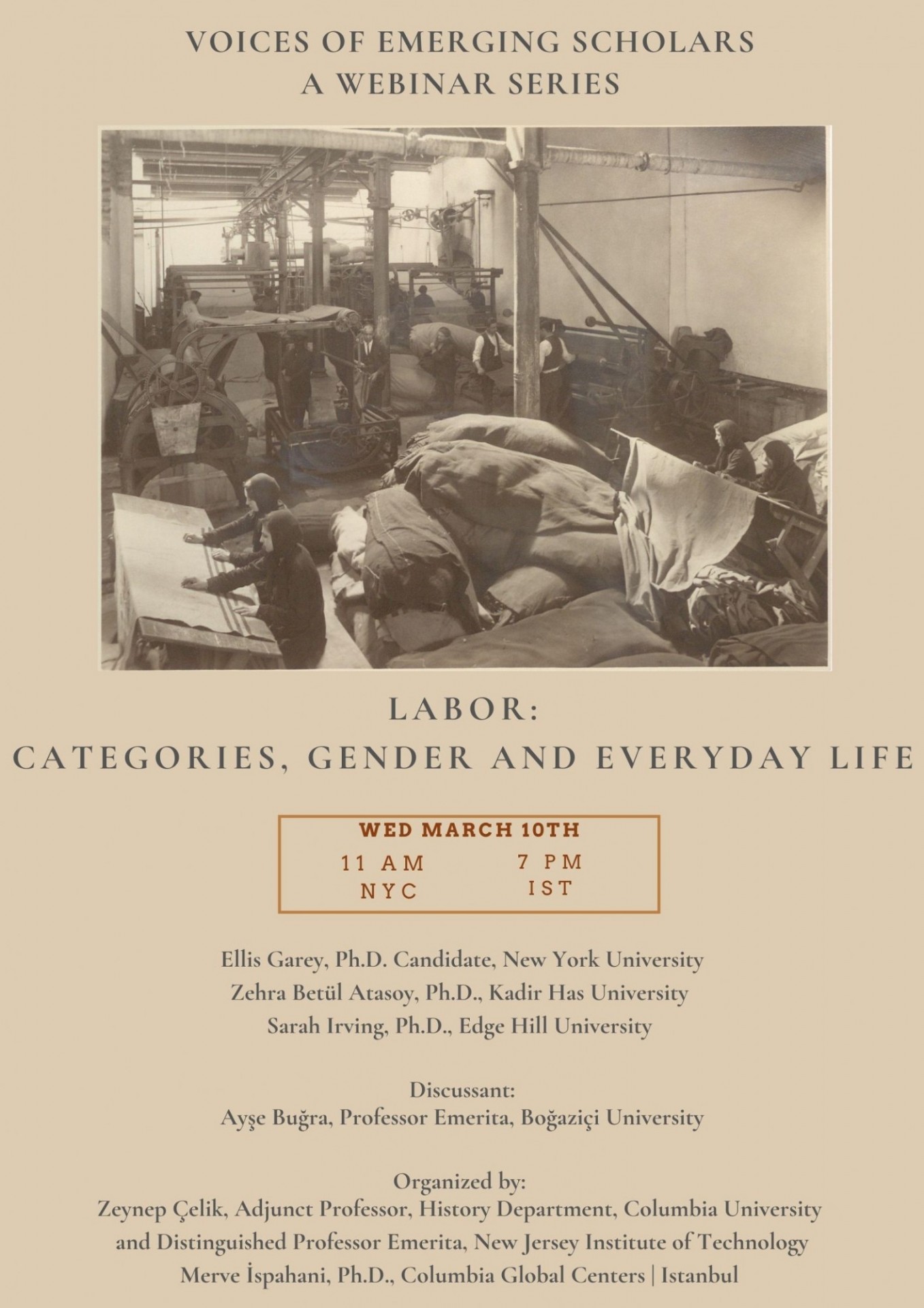
Our third workshop, "Labor: Categories, Gender, and Everyday Life" re-considers approaches to labor history in a large Ottoman geography.
More information on the program is below.
Watch the video here.
‘The Worker’ as a Contested Category in Early 20th Century Beirut
Ellis Garey
Ellis Garey is a Ph.D. Candidate in History and Middle Eastern Studies at New York University. Her dissertation focuses on the emergence of the “worker” as a key participant in new forms of social contestation and mass politics in Greater Syria during the late Ottoman and early post-Ottoman periods (1880-1936). She is currently a Ph.D. Fellow at Koç University’s Research Center for Anatolian Civilizations (ANAMED).
Gendered Expressions of Labor: The Case of Sümerbank Textile Factory, Istanbul
Zehra Betül Atasoy
Zehra Betül Atasoy is currently working as a Visiting Scholar at Kadir Has University, Faculty of Art and Design. She holds a Ph.D. in the Urban Environment-History specialization from a dual degree program of the New Jersey Institute of Technology and Rutgers University. She earned her bachelor’s degree in Architecture from Istanbul Technical University where she also got her master’s degree in History of Architecture. Besides, she worked as an editor at Arkitera Architecture Center and other architectural platforms. Her research focuses on the quotidian urban practices of women from various social strata in early Republican Istanbul and aims to recover their overlooked stories through different reformation efforts in fragmented urban spaces.
Women Versus Wheelbarrows: Archaeological Labor and British Imperialism in Late Ottoman Palestine
Sarah Irving
Sarah Irving received her Ph.D. from the University of Edinburgh (2018) for a project on subaltern intellectual histories in Mandate Palestine. She is currently a Leverhulme Early Career Fellow at Edge Hill University (NW England), researching the history of the 1927 Jericho Earthquake and the insights it offers into the social and intellectual history of the Levantine Mandates. She also works on social histories of Euro-American archaeology in Palestine and the wider Levant, focusing on the role and experiences of local workers on excavations. She has published in a range of journals and edited volumes. She is the editor of Contemporary Levant, a journal of Council for British Research in the Levant.
Discussant:
Ayşe Buğra
Ayşe Buğra is Professor Emerita at Boğaziçi University and an affiliate of the Boğaziçi University research center Social Policy Forum, which she co-founded in 2004. She has published in the areas of social policy, state–business relations and socio-economic history of modern Turkey in academic journals including International Journal of Middle East Studies, Economics and Philosophy, International Journal of Urban and Regional Research, Social Politics, Development and Change. Her books in English include New Capitalism in Turkey: The Relationship between Politics, Religion and Business (2014) and edited books Trajectories of Female Employment in the Mediterranean (2012) and Reading Karl Polanyi for the 21st Century (2007). She is a member of the Science Academy Society of Turkey.
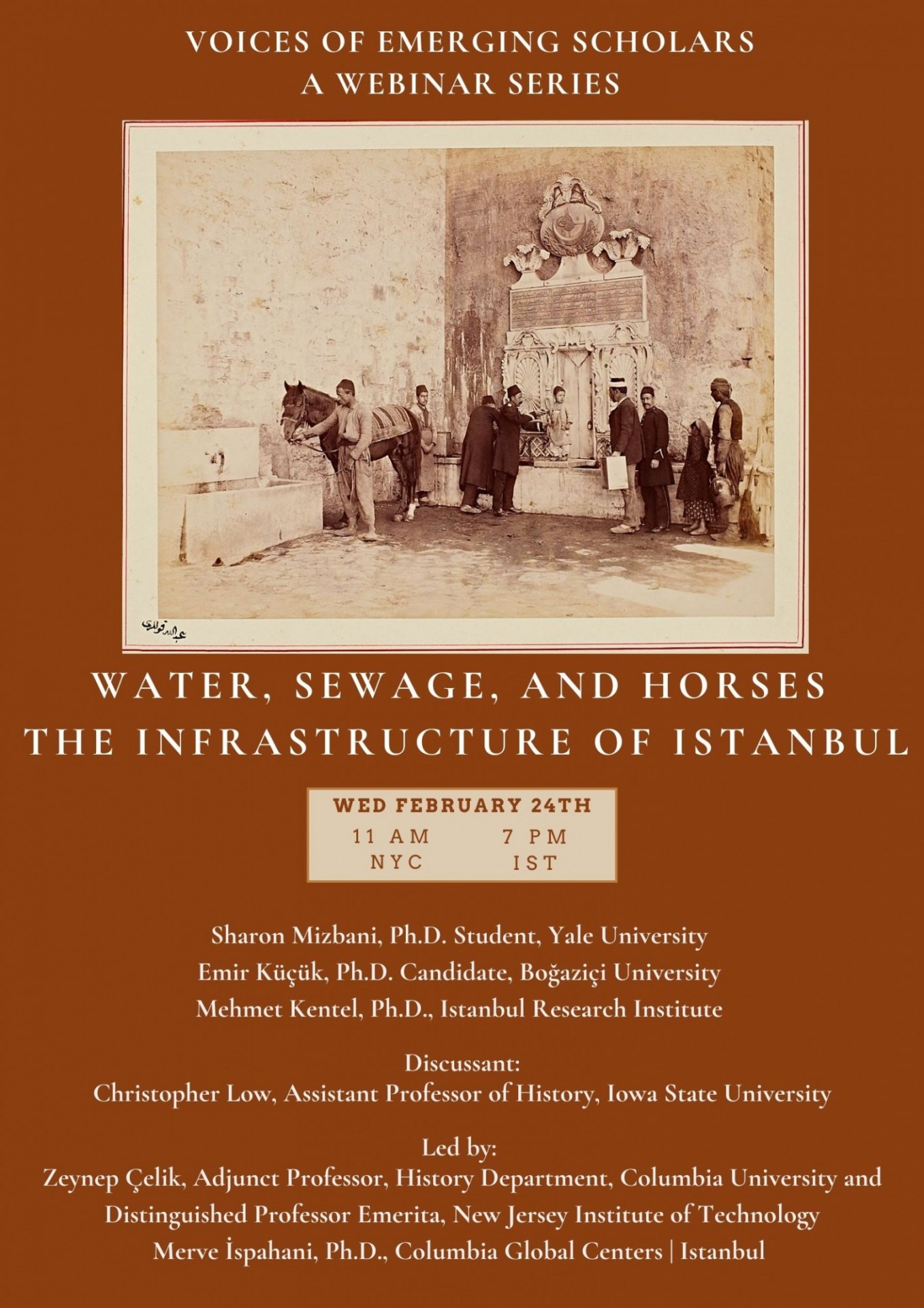
Our second workshop, "Water, Sewage, and Horses: The Infrastructure of Istanbul" examines the modernization of 19th century Istanbul from new perspectives.
More information on the program is below.
Watch the video here.
The Art of Infrastructure: Hamidiye Fountains in Ottoman Istanbul
Sharon Mizbani
Sharon Mizbani is a Ph.D. student at Yale University in the History of Art Department specializing in the comparative architectural history of the late-Ottoman Empire and Qajar Iran, with a particular focus on the development of urban water infrastructure and related monuments during the nineteenth century. She received her B.A. from the Near and Middle Eastern Civilizations department at the University of Toronto in 2015, and her M.A. from the same institution in 2016. She has also studied at Boğaziçi University in Istanbul, Turkey.
Horses of the Constantinople Tramway Company in 1871 - 1914
Emir Küçük
Mustafa Emir Küçük graduated from History Department at Boğaziçi University in 2016. He obtained an MA degree from the Ataturk Institute for Modern Turkish History, Boğaziçi University in 2019. Küçük is currently a Ph.D. student in the same institute. In addition to his doctoral studies, he contributed to the cataloguing of teachers' biographies from the late-Ottoman period at Salt Archive in 2017. Küçük is also a researcher at Şehir Dedektifi, in the project of Balat: Living Together, which will result in a chapter in a book. Emir Küçük is interested in urban history, environmental history, and the history of children.
Pera, Kasımpaşa, Sewers, and Maps: Representing Infrastructural Entanglements in the Nineteenth-Century Istanbul
Mehmet Kentel
K. Mehmet Kentel works on the urban and environmental history of late Ottoman Istanbul. He received his Ph.D. from the University of Washington in 2018 with his dissertation Assembling ‘Cosmopolitan’ Pera: An Infrastructural History of Late Ottoman Istanbul,” which he is currently revising for publication as a monograph. He is the Research Projects Manager at the Istanbul Research Institute and the Managing Editor of YILLIK: Annual of Istanbul Studies. His curatorial work includes Memories of Humankind: Stories from the Ottoman Manuscripts at the Istanbul Research Institute (curator, 2019) and The Characters of Yusuf Franko: An Ottoman Bureaucrat’s Caricature at Koç University’s Research Center for Anatolian Civilizations (co-curator, 2017).
Discussant:
Michael Christopher Low, Assistant Professor of History at Iowa State University
Michael Christopher Low received his Ph.D. from Columbia University. Low is an Assistant Professor of History at Iowa State University and is currently a Senior Humanities Research Fellow for the Study of the Arab World at NYU Abu Dhabi (2020-2021). He is the author of Imperial Mecca: Ottoman Arabia and the Indian Ocean Hajj (Columbia University Press, 2020) and co-editor of The Subjects of Ottoman International Law (Indiana University Press, 2020).
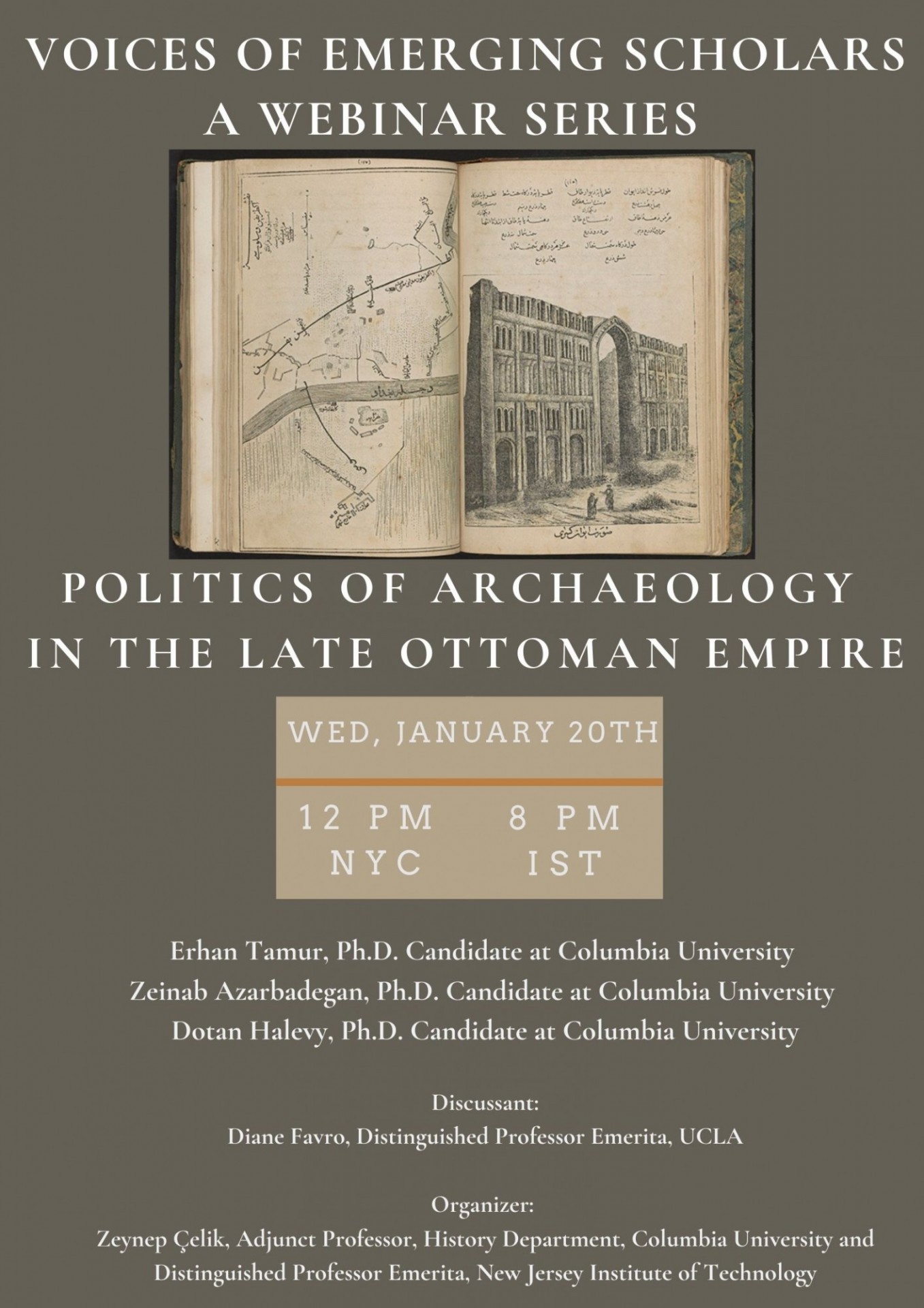
Our inaugural workshop, "Politics of Archaeology" explores the entangled relationship between antiquities and imperial powers.
More information on the program is below.
Watch the video here.
Of Consuls and Steamers: Material Foundations of Colonial Archaeology in Late Ottoman Iraq
Erhan Tamur
Erhan Tamur is a Ph.D. candidate at Columbia University and a curatorial research associate at the Morgan Library & Museum. He has worked and published on late nineteenth- and early twentieth-century art historical theory, style and ethnicity, and the politics of archaeology. His dissertation, entitled “Site-Worlds: An Account of Material Lives from Tello (ancient Girsu),” brings the art history of a Sumerian site from the third millennium BC into the present and is supported by a two-year fellowship from the Center for Advanced Study in the Visual Arts (CASVA) of the National Gallery of Art.
Ottomans and Iranians at Ctesiphon
Zeinab Azarbadegan
Zeinab Azarbadegan is a Ph.D. Candidate in the Department of History at Columbia University. Her dissertation focuses on the myriad ways that Ottoman Iraqi space was contested between the Ottomans, the Qajars, and the British in the late nineteenth century. She is currently working as a research assistant and co-curator for the Qattan Foundation’s Palestine from the Sky Exhibition. Her work has appeared in the Journal of Ottoman and Turkish Studies (JOTSA), Jerusalem Quarterly, and the journal of Philological Encounters.
The British “Antiquities Threshold” and the Muted Legacy of Ottoman Legislation
Dotan Halevy
Dotan Halevy is a Ph.D. Candidate in Columbia University Department of History. His research focuses on the culture, society, and environment of the late and post-Ottoman Middle East. Dotan's doctoral dissertation entitled "Stripped: Ruination, Liminality, and the Making of the Gaza Strip 1840-1950" (expected July 2021) is a study of the long "stripping" of the Gaza borderland from its historic economic and political centrality.
Discussant:
Diane Favro, Distinguished Professor Emerita, UCLA